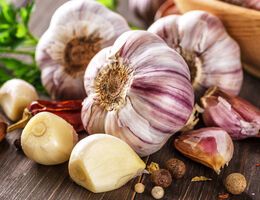Health library
Back to health libraryGet to know garlic

Oct. 30, 2025—Garlic is a popular flavor in cuisines from around the world. While the U.S. Department of Agriculture confirms that garlic is considered a vegetable, it's often used as an herb or spice—and, throughout recorded history, a medication. But how does garlic really affect your health?
What the science says
There's no disputing that garlic is a nutritional powerhouse. It contains potassium; calcium; magnesium; iron; and vitamins A, C and B complex. But it's long been rumored to have effects on everything from cancer risk to the common cold. Here's what research reveals about garlic's effects on:
Inflammation. Garlic contains an anti-inflammatory compound called diallyl disulfide. Adding it to your diet could help prevent cartilage damage from arthritis, says the Arthritis Foundation.
Cholesterol. According to the National Center for Complementary and Integrative Health (NCCIH), garlic supplements may help lower cholesterol levels in people with high cholesterol. Studies showed garlic supplements reduced both total and LDL (bad) cholesterol—but not as much as cholesterol meds.
Blood pressure. A 2020 meta-analysis in Antioxidants, an international, peer-reviewed journal, found that adding garlic supplements or raw crushed garlic helped lower blood pressure in people with hypertension.
Cancer. Laboratory studies have found that allicin, a compound released when garlic is cut or crushed, could help fight cancer. But high quantities of allicin in a lab aren't the same as the amount people could consume in their diets. And human studies have not found a clear benefit, cautions the American Institute for Cancer Research.
Colds. Garlic might make chicken soup taste better. But as for its effects on colds, evidence is lacking, reports the NCCIH.
Planning to give garlic a try? While it's safe for most people, garlic does come with risks as well as benefits:
- Medication interactions. For example, garlic can increase the risk of bleeding. So if you take blood thinners, it's important to talk to your doctor before starting supplements or changing your diet.
- Bad breath. Garlic's sulfur-based compounds can lead to halitosis. Chewing on raw mint, raw lettuce or raw apple can help reduce the smell.
- Digestive trouble. Garlic, particularly raw, can cause heartburn, an upset stomach, nausea, flatulence and abdominal pain.
Dish up the benefits
Beyond its health benefits, cooking with garlic—either fresh bulbs or dried garlic powder—perks up chicken, fish, pasta, salads, vegetables and more. And that can make eating healthy more delicious. It can even reduce the need to add salt to your favorite foods.
Sources
- AARP. "10 Fresh Herbs That Have Surprising Health Benefits." https://www.aarp.org/health/healthy-living/fresh-herb-health-benefits.
- American Heart Association. "Sorting Folklore From Fact on the Health Benefits of Garlic." https://www.heart.org/en/news/2021/04/19/sorting-folklore-from-fact-on-the-health-benefits-of-garlic.
- American Institute for Cancer Research. "Garlic: Lab Studies Find Potential Cancer-Preventive Compounds." https://www.aicr.org/cancer-prevention/food-facts/garlic/.
- Arthritis Foundation. "Best Spices for Arthritis." https://www.arthritis.org/health-wellness/healthy-living/nutrition/healthy-eating/best-spices-for-arthritis.
- International Food Information Council. "Cutting Down on Sodium: 6 Alternatives to Salt." https://www.ific.org/resources/articles/cutting-down-on-sodium-6-alternatives-to-salt.
- National Center for Complementary and Integrative Health. "Garlic: Usefulness and Safety." https://www.nccih.nih.gov/health/garlic.
- National Center for Complementary and Integrative Health. "High Cholesterol and Natural Products: What the Science Says." https://www.nccih.nih.gov/health/providers/digest/high-cholesterol-and-natural-products-science.
- National Library of Medicine. "Potential Health Benefit of Garlic Based on Human Intervention Studies: A Brief Overview." https://pmc.ncbi.nlm.nih.gov/articles/PMC7402177/.
- U.S. Department of Agriculture. "Celebrate National Garlic Day With Facts About the Popular Cooking Ingredient." https://www.usda.gov/about-usda/news/blog/celebrate-national-garlic-day-facts-about-popular-cooking-ingredient.
